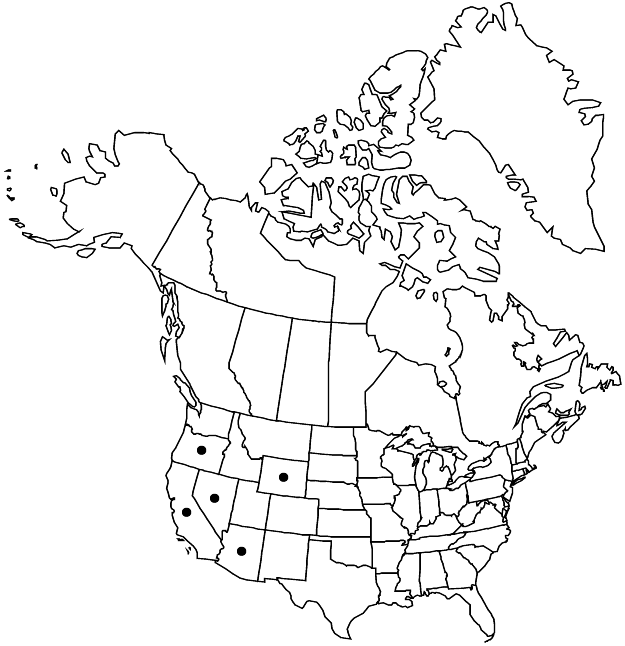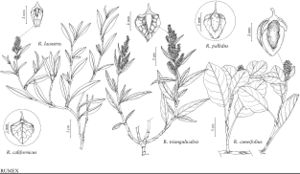Difference between revisions of "Rumex californicus"
Repert. Spec. Nov. Regni Veg. 40: 297. 1936.
FNA>Volume Importer |
imported>Volume Importer |
||
| (6 intermediate revisions by 2 users not shown) | |||
| Line 8: | Line 8: | ||
}} | }} | ||
|common_names=California willow dock | |common_names=California willow dock | ||
| + | |special_status={{Treatment/ID/Special_status | ||
| + | |code=F | ||
| + | |label=Illustrated | ||
| + | }} | ||
|basionyms= | |basionyms= | ||
|synonyms={{Treatment/ID/Synonym | |synonyms={{Treatment/ID/Synonym | ||
|name=Rumex salicifolius var. denticulatus | |name=Rumex salicifolius var. denticulatus | ||
|authority=Torrey | |authority=Torrey | ||
| + | |rank=variety | ||
}} | }} | ||
|hierarchy=Polygonaceae;Polygonaceae subfam. Polygonoideae;Rumex;Rumex subg. Rumex;Rumex sect. Axillares;Rumex californicus | |hierarchy=Polygonaceae;Polygonaceae subfam. Polygonoideae;Rumex;Rumex subg. Rumex;Rumex sect. Axillares;Rumex californicus | ||
| Line 27: | Line 32: | ||
|elevation=0-3000 m | |elevation=0-3000 m | ||
|distribution=Ariz.;Calif.;Nev.;Oreg.;possibly n Mexico. | |distribution=Ariz.;Calif.;Nev.;Oreg.;possibly n Mexico. | ||
| − | |discussion=<p>Rumex californicus is closely related to and often is regarded as a variety of R. salicifolius.</p><!-- | + | |discussion=<p><i>Rumex californicus</i> is closely related to and often is regarded as a variety of <i>R. salicifolius</i>.</p><!-- |
| − | --><p>In Oregon this species has been reported only as a ballast waif in the Albina neighborhood of Portland (K. H. Rechinger 1937). It has been reported also from northeastern Nevada (J. T. Kartesz 1987, vol. 1), New Mexico (W. C. Martin and C. R. Hutchins 1980), and Wyoming (N. M. Sarkar 1958), but these records require confirmation.</p> | + | --><p>In Oregon this species has been reported only as a ballast waif in the Albina neighborhood of Portland (K. H. Rechinger 1937). It has been reported also from northeastern <i>Nevada</i> (J. T. Kartesz 1987, vol. 1), New Mexico (W. C. Martin and C. R. Hutchins 1980), and Wyoming (N. M. Sarkar 1958), but these records require confirmation.</p> |
|tables= | |tables= | ||
|references= | |references= | ||
| Line 37: | Line 42: | ||
-->{{#Taxon: | -->{{#Taxon: | ||
name=Rumex californicus | name=Rumex californicus | ||
| − | |||
|authority=Rechinger f. | |authority=Rechinger f. | ||
|rank=species | |rank=species | ||
| Line 51: | Line 55: | ||
|publication title=Repert. Spec. Nov. Regni Veg. | |publication title=Repert. Spec. Nov. Regni Veg. | ||
|publication year=1936 | |publication year=1936 | ||
| − | |special status= | + | |special status=Illustrated |
| − | |source xml=https:// | + | |source xml=https://bitbucket.org/aafc-mbb/fna-data-curation/src/2e0870ddd59836b60bcf96646a41e87ea5a5943a/coarse_grained_fna_xml/V5/V5_1043.xml |
|subfamily=Polygonaceae subfam. Polygonoideae | |subfamily=Polygonaceae subfam. Polygonoideae | ||
|genus=Rumex | |genus=Rumex | ||
Latest revision as of 22:07, 5 November 2020
Plants perennial, glabrous, with vertical rootstock. Stems usually ascending, rarely decumbent-ascending or suberect, usually producing axillary shoots below 1st-order inflorescence or at proximal nodes, 30–60 cm. Leaf blades linear-lanceolate or linear-oblanceolate, 5–10 × 1–3 cm, usually ca. (3–)5–7 times as long as wide, usually widest near middle, thin or, occasionally, subcoriaceous, base cuneate, margins entire, flat or, occasionally, undulate near base, apex acute or attenuate. Inflorescences terminal and axillary, terminal usually occupying distal 1/5–1/3 of stem, lax, interrupted at least in proximal 1/2, usually broadly paniculate (branches simple or with few 2d-order branches). Pedicels articulated in proximal 1/3 or almost near base, filiform, 3–8 mm, not more than 2–2.5 times as long as inner tepals, articulation indistinctly swollen. Flowers 10–15(–20) in whorls; inner tepals usually broadly triangular or deltoid, 2.5–3.5 × 2.2–3.3 mm, base truncate, margins minutely but distinctly denticulate, rarely subentire, apex obtuse or subacute; tubercles absent, or only 1 midvein slightly swollen. Achenes brown or dark reddish brown, 2 × 1.3 mm. 2n = 20.
Phenology: Flowering late spring–summer.
Habitat: Moist coastal, alluvial, and montane habitats
Elevation: 0-3000 m
Distribution

Ariz., Calif., Nev., Oreg., possibly n Mexico.
Discussion
Rumex californicus is closely related to and often is regarded as a variety of R. salicifolius.
In Oregon this species has been reported only as a ballast waif in the Albina neighborhood of Portland (K. H. Rechinger 1937). It has been reported also from northeastern Nevada (J. T. Kartesz 1987, vol. 1), New Mexico (W. C. Martin and C. R. Hutchins 1980), and Wyoming (N. M. Sarkar 1958), but these records require confirmation.
Selected References
None.
